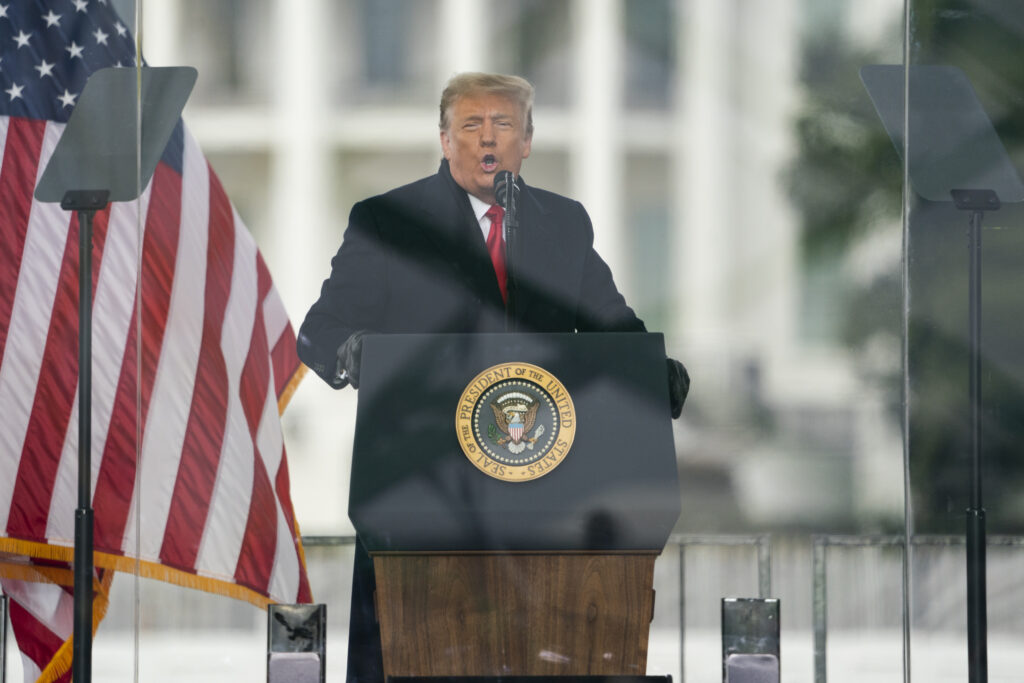Trump Readies His Reply to Jack Smith’s Filing That He Calls a ‘Hit Job’ and ‘Monstrosity’
The 45th president has a deadline of next week to respond to the special counsel’s case that he ‘must stand trial for his private crimes as would any other citizen.’

President Trump’s deadline of October 17 to respond to Special Counsel Jack Smith’s immunity opus is set to emerge as a crucial date in the 45th president’s efforts to stave off a conviction — and a defeat in November’s election.
Judge Tanya Chutkan last week unsealed a partially redacted edition of Mr. Smith’s argument for why Trump can be tried for the events of January 6, 2021, even after the Supreme Court ruled that official presidential acts are presumptively immune. The prosecutor writes that Trump “must stand trial for his private crimes as would any other citizen.”
Trump sought to block the brief, which ran to quadruple the page limit usually allotted to court filings. Mr. Smith, though, persuaded Judge Chutkan that the book-length brief — the fullest account to date of his election interference case — was the most efficient vehicle for determining the reach of Trump’s immunity. The justices returned the case to Judge Chutkan to determine what of Mr. Smith’s case can withstand immunity.
The former president, though, called the document a “monstrosity” and a “false hit job.” He maintains that its appearance in the public square violates his constitutional rights, short-circuits the government’s duty under Brady v. Maryland to provide him with evidence, and runs afoul of the Department of Justice’s own regulations prohibiting election interference. Now, though, his lawyers owe Judge Chutkan a response.
Trump has already offered clues for the shape that response could take. Last week, he renewed his effort to dismiss the case by contending that Mr. Smith “seeks to assign blame for events President Trump did not control,” like the riot of January 6. He cites another Supreme Court case, McDonnell v. United States, for the proposition that some prosecutions cast a pall over the “basic compact underlying representative government.”
The former president, though, is likely to argue that Mr. Smith’s brief, like his second and slimmed-down indictment, is crosswise with the Supreme Court’s immunity ruling, captioned Trump v. United States. That decision explained that Trump’s interactions with Vice President Pence are “at least presumptively immune from prosecution” because, “Whenever the President and Vice President discuss their official responsibilities, they engage in official conduct.”

Mr. Smith, though, dilates at length on those colloquies, both in his indictment and his treatise on immunity. In the latest door-stopper, he alleges that Trump, when told that Mr. Pence could be in peril at the Capitol, replied, “So what?” The special counsel contends that this response discloses the “private nature” of Trump’s “desperate conduct as a candidate, rather than a President.”
Another point on which Mr. Smith could be vulnerable to riposte is the special counsel’s focus on Trump’s tweets on January 6. The prosecutor, with a novelist’s eye for detail, describes how “alone in his dining room,” Trump tweeted that “Mike Pence didn’t have the courage to do what should have been done to protect our Country … USA demands the truth!”
Chief Justice Roberts’s majority opinion in Trump, though, reckoned that “most of a President’s public communications are likely to fall comfortably within the outer perimeter of his official responsibilities,” adding: “The President possesses ‘extraordinary power to speak to his fellow citizens and on their behalf.’” The justices did acknowledge that “there may, however, be contexts in which the President speaks in an unofficial capacity—perhaps as a candidate for office or party leader.”
Mr. Smith insists that the character of Trump’s tweets on January 6 reflect that of a “candidate for office or party leader” rather than an incumbent president owed the prerogatives of the office, but the high court requires more than just a declaration. Instead, it mandates an inquiry into an “objective analysis of ‘content, form, and context,’” to determine whether a given speech — or tweet — is best understood as official or unofficial.
The Supreme Court delegated to Judge Chutkan the responsibility to “assess in the first instance” whether these swaths of evidence — and others — are official or unofficial, immune or bereft of immunity. She will have the first say — and she has been sympathetic to the government so far — but not the final one. Any decision she hands down will be reviewed by the the District of Columbia Circuit of the United States Court of Appeals, and possibly, the Supreme Court.
Both Judge Chutkan and the circuit riders came in for rebuke from the Supreme Court in Trump. Chief Justice Roberts took issue with the “expedition of this case, the lack of factual analysis … and the absence of pertinent briefing.” It could be that if the immunity issue once again ascends the appellate ladder, the justices could take even greater exception to the release of Mr. Smith’s motion long before trial — and immediately before the election.

